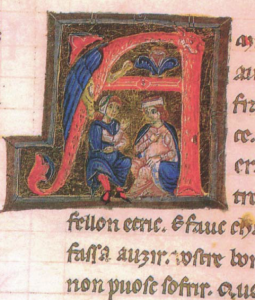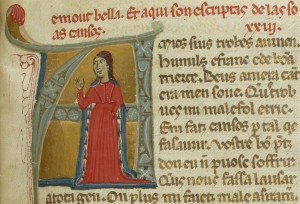(Castelloza and an anonymous chavalier, Vatican Library lat 5232 MS A f. 168v)
It has been a while, but I continue my translation and brief analysis of Castelloza within my Trobairitz research. I didn’t mean to take so long, but this is a peripheral study disjointed from my primary research or other projects. At the moment I don’t know if I will be doing anything with this other than creating a series of blog posts as I translate each of the Trobairitz poems piecemeal. But, honestly, I am hooked and can’t stop. The Trobairitz are like the sirens of medieval studies, beckoning me to their chansons despite the ticking time-bomb of pending deadlines and papers looming, ever closer as Fall season approaches even though we have not yet even crossed the threshold of Spring.
Alright, enough ranting…. here is my latest (ever small) contribution to the Trobairitz tradition of a translation of Castelloza’s “Mout avetz.” Yes, her work has previously been translated, but I have found I understand the works better when I provide my own translations and analyses.
Amics, pois de mi.us partitz,
Et es me greu e salvatge,
Quar me juretz e.m plevitz
Que als jorns de vostra vida
Non acsetz dompna mas me;
E si d’autra vos perte,
M’avetz morta e trahida,
Qu’avi’en vos m’esperanssa
Que m’amassetz ses doptanssa.
Bels amics, de fin coratge
Vos amei, pois m’abellitz,
E sai que faich ai follatge,
Que plus m’en etz escaritz;
Qu’anc non fis vas vos ganchida,
E si.m fasetz mal per be:
Be.us am e non m’en recre;
Mas tan m’a amors sazida
Qu’ieu non cre que benananssa
Puosc’aver ses vostre’amanssa.
Mout aurai mes mal usatge
A las autras amairitz:
Qu’om sol trametre messatge
E motz triatz e chausitz.
Et ieu tenc me per garida,
Amics, a la mia fe,
Quan vos prec, qu’aissi.m.cove;
Que.l plus pros n’es enriquida
S’a de vos qualqu’aondanssa
De baissar o d’acoindanssa.
Mal aj’ieu s’anc cor voltage
Vos aic ni.us fui camjairitz,
Ni drutz de negum paratge
Per me non fo encobitz;
Anz sui pensiv’e marrida
Car de m’amor nu.us sove,
E si de vos jois no.m ve,
Tost me trobaretz fenida:
Car per pauc de malananssa
Mor dompna, s’om tot no.il lanssa.
Tot lo maltraich e.l dampnatge
Que per vos m’es escaritz
Vos fai grazer mos linhatge
E sobre totz mos maritz;
E s’anc fetz vas me fallida,
Perdon la.us per bona fe;
E prec que venhatz a me,
Despois quez auretz auzida
Ma chanson, que.us fatz fiansa
Sai trobetz bella semblansa.
Friend, since you parted from me,
And it is to me hard and cruel,
Because to me you swore and pled
That all the days of your life
You will have no lady but me;
And if in another you lose yourself,
You will have me dead and betrayed,
Because in you I have my faith
That you love me without hesitation.
Fine friend, of boundless heart
I love you, since you pleased me,
And I know I was foolish;
For which you abandoned me;
Though I have never denied you,
And if you give me bad for good:
I love you and wish you no ill;
Since love so has seized me
When I can believe no goodness
Could be had without your love.
A most terrible practice I show
To all other female lovers:
When a man usually sends the message
And tries and chooses his words.
And I am thought fulfilled,
Friends, by my faith,
When I provoke you, as it fits me;
As the most deserving woman is enriched
If she gains from you enough
Kisses and embraces.
Bad luck to me if ever I had a rancid heart
Towards you or was counterfeit,
Or another favorite of any class
Was had by me;
I am sooner pensive and tormented
Because my love is not known,
And if from you joy is not found
Then you will find me dead:
Because from her affliction
A lady will die if not helped.
For all the mistreatment and the damage
That you have brought me
My family will grace you
And more so will my husband;
And if ever towards me you were false,
I pardon you in good faith;
And I pray you come to me,
After you will have heard
My song, when I assure you
You will find a nice reception.
First, the poem follows Castelloza’s general style of the five stanza format while also maintaining the stricter style and subject of Trobairtiz poetry. She laments the loss of her love, his betrayal, and her subsequent suffering, but she places no blame upon him and proceeds to forgive him for the pain he has inflicted upon her. Yet once again her forgiveness is laced with anger towards his abandonment as she indirectly chastises him for his neglect.
Nevertheless she delivers her poem with a dose of sarcasm that does not escape detection, and also conveniently allows us a glimpse into her society. The time of greatest activity for the Trobairitz coincided with an overall renaissance in women’s rights since in the middle of the twelfth century in France, especially in the southern regions and Occitania, women regained much of the power they had not seen for nearly two hundred years. Thus when Castelloza steps into the dominant role, generally reserved for her male counterpart in poetry, she does so from the vantage point of a woman in possession of not just her quill and voice, but uses that voice to echo her position in society. She may be (as I discussed in a previous post) socioeconomically beneath her love interest, nevertheless regardless of her reasons for positioning herself beneath him, it is not because she is a woman. In other words, the implication here is that her stance which positions her beneath her lover is as much a self created pose as it is for the male Troubadour who castigates himself at the foot of his lady’s pedestal.
She blatantly recognizes her reversal as she concedes that general practice is “Qu’om sol trametre messatge,” (When a man usually sends the message) of love to an ever patiently awaiting woman. Bouchard analyzed these lines as an apology where Castelloza negotiates her place within a poetic tradition through a pseudo apology – a practice the Troubadours never had to partake in since it was implied that men never had to apologize for their existence in any sphere and could move with a freedom unreserved for women. While I love Bouchard’s close reading of these lines, I do have to disagree and found another reason for Castelloza’s insertion of these seemingly apologetic lines. Almost smirkingly Castelloza acknowledges that her behavior sets a terrible example for all other female lovers while synchronously encouraging them to do the same. She is not apologizing as much as drawing attention to the solidarity between women who will now partake in this perhaps liberating behavior and act upon their desires as opposed to remaining within the confined roles of passive love interests. Her apology is really just a nod towards the agency she has a hand in eliciting. There are in fact several instances within the chanson that mark her extrapolation from self to a universal feminine exemplum – her personal grief and simultaneous joy derived from her lover become the suffering and joy of every woman. These instances are set off from the rest of the chanson by her deliberate usage of the third person pronoun as she moves from “I” to “she” and from “my” to “her” (lines 28-30 and 39-40).
Even though there are innumerable more points to be discussed here, especially concerning the feudal language she employs that allows us an even more detailed glimpse into the relationship between her and her lover, I think that is best left to another time – perhaps one day this will be more than just a series of blogposts.
In the meantime, I want to draw attention to one last bit of a testament to what I feel is Castelloza’s sense of humor. The last stanza has been translated differently by Dronke and Paden in regards to her family and their response, real or perceived, to her predicament. My own translation is also a bit different, but as Bec has stated, what can be surmised and agreed upon is her reference to having a husband. I do not believe her family/lineage or husband will be elevated due to her status as a Trobairitz as others have stipulated, so the pain her lover has inflicted upon her for which those around her are glad is not reflective of their joy at the literary and performative success that the suffering has brought about, but rather it is an ironically descriptive statement. Most notably her husband’s joy at her misfortune would fit perfectly well within the genre of a malmarie where Castelloza acknowledges her husband and lover within the same composition while the former would have every reason to rejoice at the grief the latter inflicts upon his adulterous wife. And Castelloza does not skirt the issue. This is the work of a woman in control of her situation who doesn’t paint fairy tales, but navigates the problematic reality of her dual existence by choosing to candidly admit her reality one line before negating its importance as she returns her attention to her lover and her unending love for him despite how he torments her. Much like in her poem, Amics, here too she ends with a promise, yet this time it is not a veiled threat of what should befall him if he abandons her, but a promise of the kind reception that awaits his return.
(Castelloza, BnF MS 843 f. 125)
Even though the actual score for this chanson has not survived, and actually only one Trobairitz musical accompaniment has been preserved, by Beatritz de Dia, I found a pleasing rendition of Castelloza’s Mout Avetz set to music. Enjoy!
Sources:
Bec, Pierre. Chants d’amour des femmes-troubadours: Trobairitz et “chasons de femme.”
Bouchard,Constance Brittain. Strong of Body, Brave and Noble: Chivalry and Society in Medieval France.
Dronke, Peter. “The Provencal Trobairitz: Castelloza.”
Gravdal, Kathryn. “Metaphor, Metonymy, and the Medieval Women Trobairitz.”
Paden, William. The Voice of the Trobairitz: Perspectives on the Women Troubadours.

